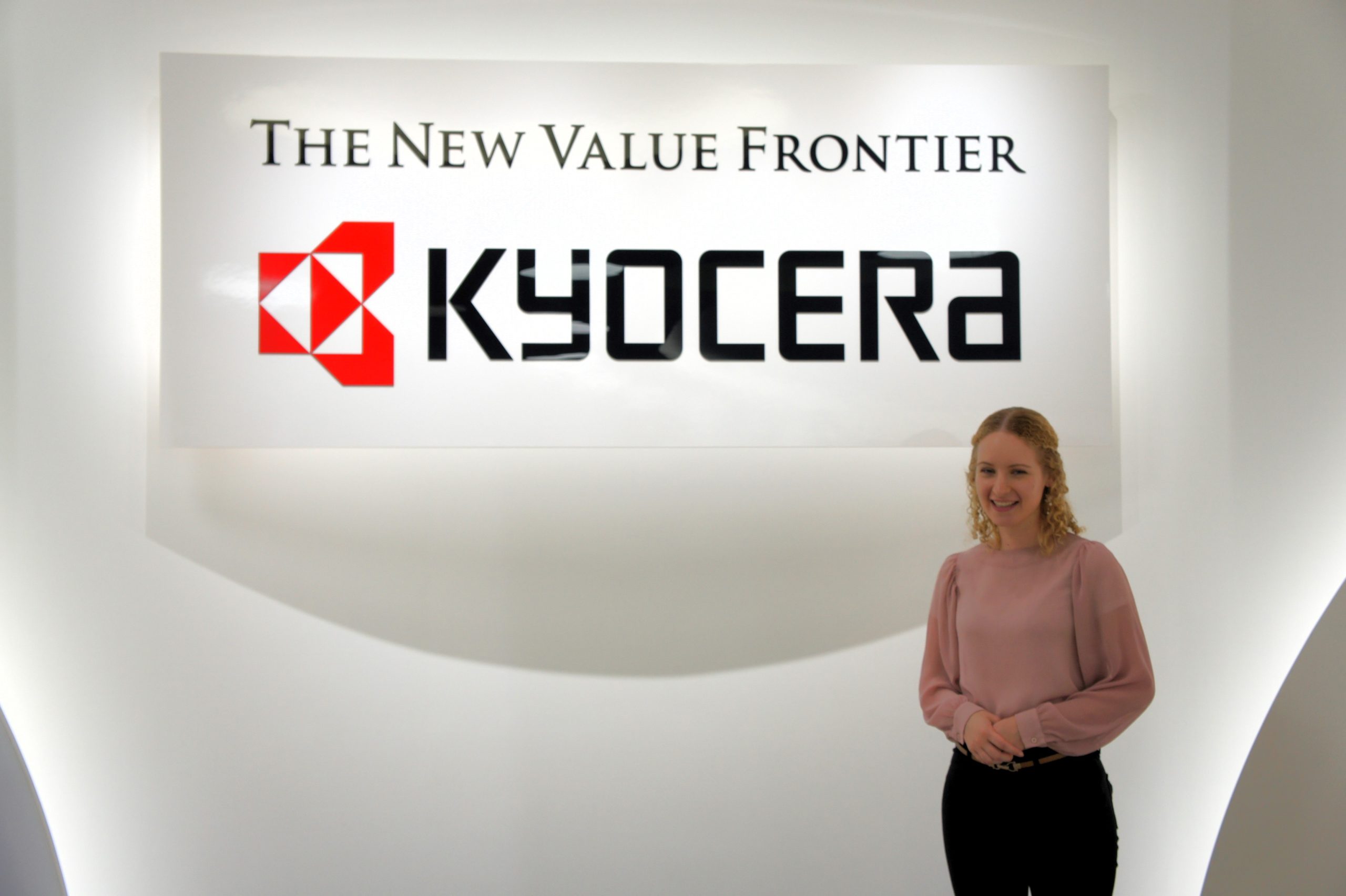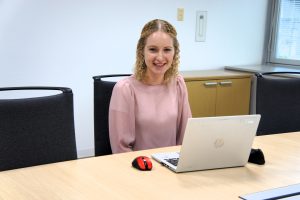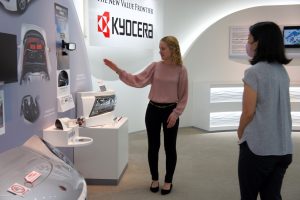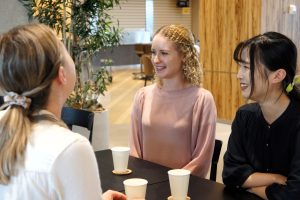I took on job-hunting full force
Kyocera Corporation
Katrina Platt (From America)
Sekolah:Doshisha University Faculty of Psychology
* Wawancara tahun 2023

You speak Japanese very well, how did you learn it?
My mother has always loved Japan, so I actually attended a Japanese school in America from the age of 5 until I graduated from high school. In that sense, I might be similar to a Japanese returnee who’s lived overseas for a long time. My parents sometimes banned English at home so that their children could learn a good balance between English and Japanese. …but my parents don’t speak much Japanese, so it’s only spoken between my brothers and sisters.
Please tell us why you chose Kyoto as your study abroad destination, and how you chose your university and major.
I majored in psychology at university, and the reason I wanted to study this field was because of my experience at the Japanese school I mentioned earlier. When I was at Japanese school, I often saw Japanese classmates who had moved overseas due to their parents’ circumstances and were struggling with the cultural gap. Interestingly, more children felt that returning to Japan from the United States was more difficult than the gap they felt when they came from Japan to the U.S. I found this strange, so I decided that I wanted to study environmental psychology and family psychology in Japan.
When choosing a place to study abroad in Japan, I knew that I wanted a place that was neither too big nor too small, so the cities in Kansai felt just right for me. I was looking for a university in Kansai that offered psychology studies, and learned about Doshisha University in Kyoto. The Department of Psychology at Doshisha emphasizes experiments and research, which was the closest to what I wanted to study, so that helped me make my decision.

Did you think about getting a job at Kyocera or the manufacturing industry while you were still in university?
I had a connection to Kyocera in the end, but I didn’t decide on working at a manufacturing company from the beginning; I considered all of my options. When I started preparing for job hunting, I didn’t really know what the industry was like, so I took part in internships in six different industries, including the airline industry, consulting, and entertainment. Out of these, I felt that a manufacturer was the best fit for me, so I focused on manufacturers in my job search after that, and interned at several companies. The internships were only for short periods of half a day, or a maximum of two weeks, but I was able to feel the difference by experiencing different environments.

You started thinking about your future job hunt from a very early stage, then.
Well, I’ve been thinking about it since I entered university. I was working part-time at the Consortium of Universities in Kyoto, and some of my work involved internships, so I think it was important that I was exposed to job-hunting-related information from an early stage. International students in particular don’t know much about the job hunting system for new graduates, which is unique to Japan, and are often one step behind in preparation and getting started, so I always advise students younger than me to get started as early as possible.
Is there anything you were especially conscious of when looking for a job?
Since I knew I’d be competing with other students, I was conscious of choosing a place where I could utilize my strengths. For example, even if I couldn’t compete with Japanese students on the SPI test, I think I’d be able to show my strengths if I could just get the opportunity to communicate face-to-face, like in an interview, so I focused on companies that had interviews even in their initial screenings. I think everyone is different, whether they’re good at reading, writing, or conversation, so I think it’s important to look for a company that suits your particular skills.
I was also under pressure to return to the U.S. if I couldn’t find a job, so I went to my university’s career center every day while job hunting. Unlike Japanese students, I couldn’t ask my parents to correct the Japanese on my application sheets, and I had to line up every day before the career center opened (laughs).

What kind of work are you doing now?
It’s been three years since I joined Kyocera, and I’m working in the Overseas Human Resources Department, where I mainly work supporting employees who transfer from Kyocera’s Japanese bases to those overseas, as well as employees who come from overseas to the Japanese headquarters, so that they can more smoothly transition. I think it’s fun to have a job where I take the lead and drive planning on my own, but I find it rewarding to support sales people and engineers so that they can transition comfortably. I get to communicate with Kyocera employees working around the world every day and get the latest information on what’s happening where they are, so there’s always something new happening.
How do you feel about the Japanese work environment after actually working there?
As a human resources officer, I explain the company rules and regulations to employees, but I also sometimes suggest revisions to suit current employees’ circumstances. I was surprised to find that the company was more receptive to change than I had imagined. Drinking parties (“nomikai”) don’t happen very often, but when they do, you’re free to join and participate as you like. Many times, I’ve also had experiences where people around me, including people from other departments, helped me when I was busy at work or when I had a problem. I also have strong connections with my colleagues who joined the company at the same time, so even though they’re in different departments and we don’t interact at all at work, we still hang out and go on trips together!

Please tell us about your future goals.
My goal is to create a workplace where everyone can work with ease, regardless of their background. Eventually, we would like people throughout the company to learn about different cultures, including those who have returned from working overseas and those in departments with foreign employees here in Japan. In my human resources support role, I’d like to minimize cultural differences and miscommunication about work by communicating Japanese rules and regulations in a way that’s easy-to-understand. Kyocera is also building a community of foreign employees who work not only at the head office in Kyoto but at all locations in Japan, so that there’s a place where they can help and encourage each other.
What advice would you share to underclassmen?
Even given the same environment, some people might find it fun and others may find it difficult. But there are opportunities to grow through all kinds of experiences, so I think your attitude is important! I like the word “ichigo ichi-e” (an expression meaning that each meeting with a person is precious). You never know what role someone or something will play in your life after you encounter it, so I think you should treasure them all!





